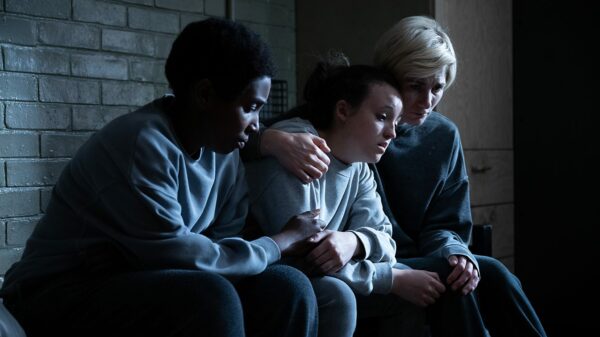Jimmy McGovern’s prison drama Time returns as Series 2 shifting its setting to a women’s prison.
Time is back this Sunday, 29th of October. Series 2 of the show promises an insight into the female prison experience, told through the stories of three very different inmates.
Here’s the premise:
Arriving at Carlingford Prison on the same day, Orla (Jodie Whittaker), Abi (Tamara Lawrance) and Kelsey (Bella Ramsey) are thrown together to face an unfamiliar world. But even with the ever-present threat of violence within its walls, they discover that an unexpected sense of community, and a shared understanding, still might be possible.
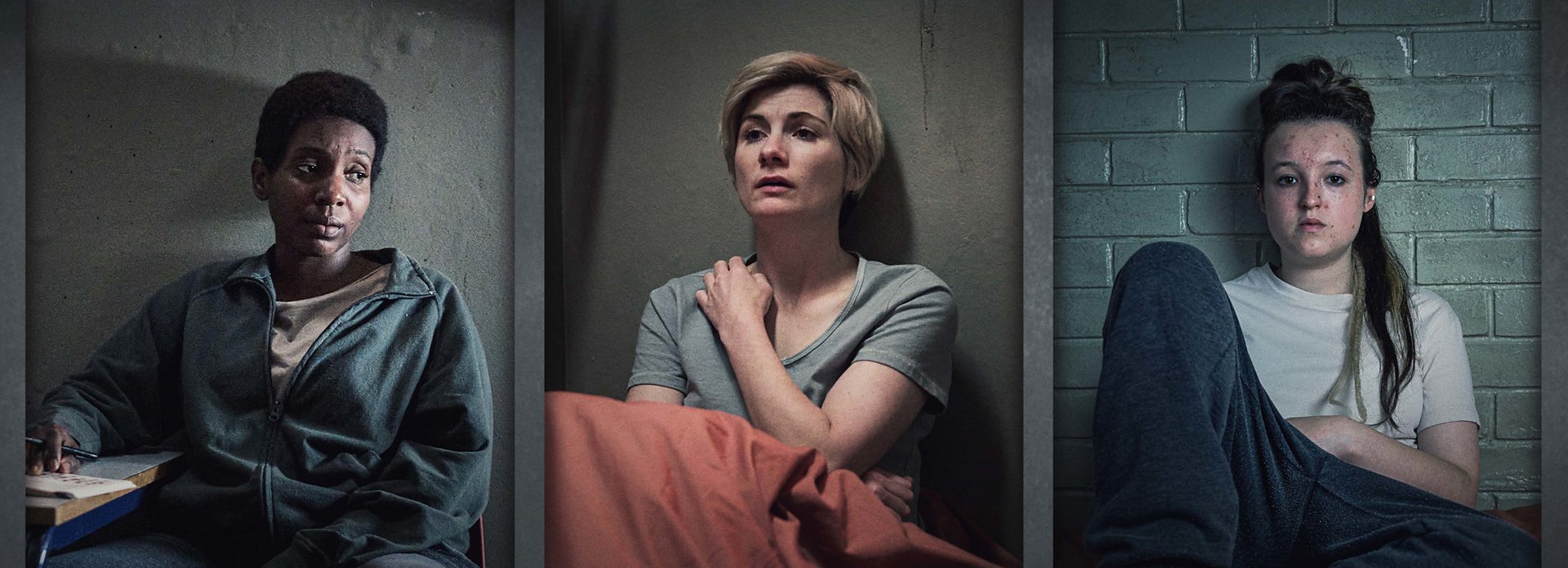
Series creator and writer Jimmy McGovern introduces the show:
There’s only one wing in our prison. By “wing” I mean one of those long, stone-walled corridors with cells down each side in which you can lock people away. In our prison, that one wing is used mainly for induction and occasionally for punishment. For the rest of the time the women are housed in large units and within them they are free to wander: to the showers, to the television lounge, to the kitchen. The front door, however, is locked.
There is no VP wing in our prison. By “VP” I mean “vulnerable prisoner” and by “vulnerable prisoner” I usually mean “sex offender”. Well, if you’re a sex offender in a British women’s prison, you have to mix with the other prisoners. No matter what you’ve done, no matter how grievous your offence, you have to mix with the other prisoners. That can be dangerous.
In our prison, and in all British women’s prisons, there are no full body searches without reasonable suspicion. That means women can hide drugs in their bodies and carry them around the prison. Many do so. Women’s bodies are more central to this drama than any other drama I have written. That’s why I needed a woman to work with. And that’s why we got Helen Black.
Helen Black has been a joy to write with. Andrea Harkin, our Derry born director, has been wonderful. So too have been the cast and crew. It’s a tough drama, this, but it is full of love. I hope you enjoy it.
Writer Helen Black talks about how she became involved:
In the Spring of 2022 I was on holiday when my agent emailed saying Jimmy McGovern was planning to write season two of Time. Excellent, I thought, loved the first one. This series was going to be set in a women’s prison. Even better, I thought. Can’t wait to watch it. As such the email continued, Jimmy wanted a female writer on board and ‘would Helen be interested in having that conversation?’ It took me six seconds to say yes.
And that’s how I found myself a few weeks later in a room above Radio Merseyside meeting one of this country’s greatest writers. A room we would return to again and again with our fabulous producers Andrew and Michael. A room where we set out to tell the stories of women serving time with integrity and brutal honesty.
Jimmy has no room for artifice in his work, there is nowhere to hide, which is why we are all drawn to these challenging yet glittering stories. We may be watching something well beyond our own experience, but it is always the humanity that leaps out at us.
I hope you enjoy this series. It has been a privilege and a pleasure to write it with Jimmy. We’ve laughed and we’ve cried and when you watch it, I know you will too.
The cast of Time Series 2: Jodie Whittaker is Orla O’Riordan
She talks about the contrast between playing this role and the Doctor:
I’ve got a career defining moment to talk about. In Doctor Who I was playing a role and in every press junket I wasn’t asked about how it felt to play that. I just was playing the Doctor and it was my own version of that character who’s an alien. It was such a wonderful experience because it was the ultimate playing pretend. And it’s been three years of running around and having this other thing which isn’t a human experience – you’re essentially playing somebody who has all this life experience so you can be incredibly mercurial and you don’t need to be limited to the constraints of the time period or the setting.
On Time, it’s been really interesting to jump back into something where you have your character’s experience and you have to be incredibly respectful and loyal about that person’s journey. With someone like Orla you’ve got to be absolutely clear about where you’re from and what the constraints and possibilities are because of who you’re playing.
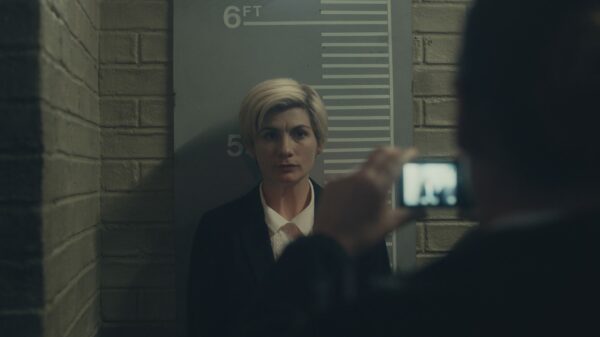
She reflects on what attracted her to the script:
I read the script and it was one of those moments where I went: ‘I don’t know if I need to read this, I think I’m probably just saying yes!’ Because I was so excited to see the culmination of names pop into my inbox of who’s doing it, the first series, who’s written it, who I was going to get to work with and all those things. And then when I started to read Orla’s storyline, I was just very excited to immerse myself in something that felt like a brilliantly difficult challenge, because I’m very lucky to not have come from Orla’s world, but I feel as if there’s so much of Orla that feels very within me and kind of within all of us. Orla’s a lioness and the decisions around the need to keep her cubs shows the fierceness of that. She emotionally leads to decisions, not academically leads to decisions, and that is me all over.
And also suggests that the show will challenge perspectives on prisons:
I think what Time series one did, and hopefully what this series is doing, is giving a face to the statistics or the problems. You can say there’s a there’s a wrong or a right, there’s a baddie and a goodie, or there’s a situation where there’s a bad decision and a good decision, but we all live in a grey area. Some of us are in a lucky position – wherever we’re coming from or are going to we are helped in many ways by society or the financial bracket you’re in. All these things are contributing factors to your daily ability to choose certain things. For Orla, the domino effect of her being in prison shatters everything for her.
Tamara Lawrance plays Abi Cochrane
She talks about her preparation for the role:
I did lots of research into stats around women’s prisons, their quality of living, and watched lots of documentaries on women’s prisons and the dynamics there. The stakes are interesting when everything becomes so myopic, particularly for people who are doing long sentences, the importance of your belongings, everything becomes heightened. If all you have to your name is the hair oil you own and the hash browns you eat for breakfast, those things become currency, and so it’s interesting to see that through those documentaries.
She also gives some hints about her character:
Abi is an inmate, she’s doing a life sentence for a crime that she is trying to keep under wraps. She has served three and a half years in a different prison and she’s in quite an anxious space because the nature of her crime was revealed in the previous prison and the inmates turned against her for that. So she’s trying to keep herself to herself, but also looks out for other inmates as well because she knows what it feels like to be ostracised.
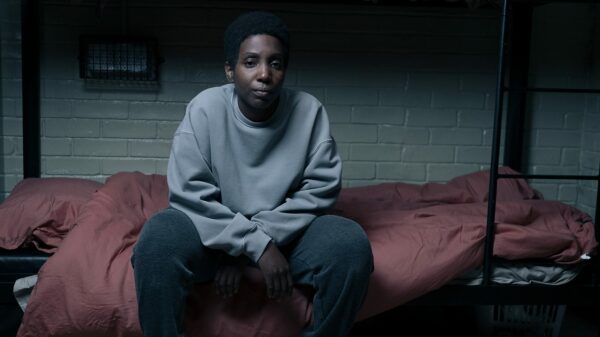
And talks about how the trio’s experiences differ:
I think the level of ostracization Abi faces hardens her. I think from the flashback, you can see that she’s the average woman that came actually from a level of privilege, which most people in prison don’t, which is part of why the other inmates struggle to sympathise with her. Effectively, there’s a fall from grace, and then coming into a landscape which she had no connection to in her history before, she recognised in the previous prison that you have to harden your demeanour. It’s a very eat or be eaten dynamic in prison. She comes across quite tough and there’s a symbiosis there – everything feeds into itself, the more people isolate her, the more she withdraws, and then the less people want to connect with her.
On top of that, there’s a moralistic hierarchy where the inmates feel a level of superiority because of the nature of their crimes compared to hers. Abi is dealing with guilt which they don’t realise at first and that seeming remorselessness is part of why they hate her. But she is riddled with sleeplessness and oral and visual hallucinations and struggles to forgive herself. I think her persona is that she doesn’t care, but I believe that she’s deeply sensitive and she shows that in the ways in which she steps in and steps up for people around her, particularly Kelsey.
Bella Ramsey is Kelsey Morgan
The star of The Last of Us introduces her character:
Kelsey is full of life. She’s a bit of a joker and very young, immature and lost. But, on the other hand, she’s seen far too much. She’s 19 and faced a lot of difficulties in her life which sends her to where she is now. When we meet her, she’s a heroin addict and she finds out she’s pregnant. Her story evolves and she comes into herself. This addiction and the state that she’s got herself into is largely informed by her boyfriend, Adam, but she’s just a bit of a lost soul who ends up working things out and finding herself.
In lots of ways, Kelsey is very far removed from me, but as we’ve been filming and going through this I’ve found a lot of similarities and it was so natural for me to play her. But initially, when I read the script, I was genuinely afraid I wouldn’t be able to do it. I’d get on set and then it just wouldn’t work. But thankfully it did, I think.
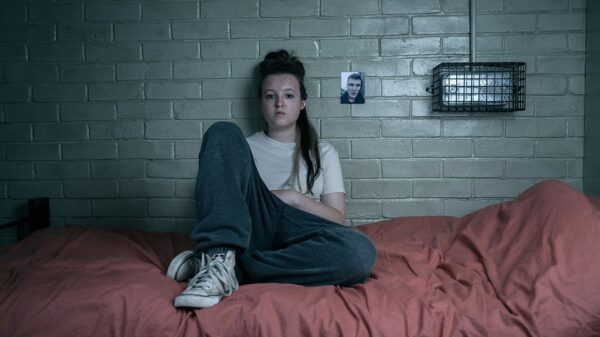
She also talks about filming emotional scenes:
There have been a lot of traumatic scenes on this and they stick in my mind because of how gruelling they were, but also how supported and safe I felt during all that. It’s also fun between takes, I think when something really funny happens during a really emotional scene it’s 1000 times funnier than it would be at any other time – the moments where you shouldn’t laugh are just the funniest. What I love about doing this is that every take you find something different. The Time storylines are so real and alive and the stakes are so high.
I’m quite good in between takes, I’m good at not carrying things with me. One of the things that I’ve done since I started in this industry is, after an emotional scene, as soon as they say cut I pull a stupid face or do a massive smile to let everybody know I’m fine. With the bigger, more physical scenes, it’s much easier to snap in and out of because you have so much adrenaline. But with the more quiet and introspective, ones, I really tried to stay in a bit more.
And talks about working with the cast:
Time is such an ensemble. Everyone’s so giving and generous – we just immediately got on and are there for each other, supporting each other, and messing about. The big group scenes with all of us are a nightmare for everybody because right up until action we’re gabbing!
The wider cast for Time Series 2 includes Siobhan Finneran, Lisa Millett, Julie Graham, Alicia Forde, Faye McKeever, Kayla Meikle, Louise Lee, James Corrigan, Matilda Firth, Brody Griffiths, Isaac Lancel-Watkinson, Maimuna Memon, Sophie Willan and Nicholas Nunn.
The show’s writers are Helen Black and Jimmy McGovern, who also executive produces. The director is Andrea Harkin and the producer is Mark Hedges. The executive producers are Priscilla Parish, Michael Parke and Andrew Morrissey for BBC Studios. Plus, Lucy Richer for the BBC, Reemah Sakaan and Stephen Nye for BritBox North America.
Time series 2 airs on BBC One at 9pm on Sunday 29th November, 2023. It will also be available on BBC iPlayer, where you can find series 1.

